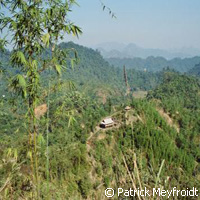Spotlight on forest shifts, trade and land use
An increasing number of developing countries are outsourcing deforestation to help protect and restore their local forests, according to a new study. The research was funded in part by the REDD-ALERT ('Reducing emissions from deforestation and degradation through alternative land uses in rainforests of the Tropics') project, which clinched EUR 3.49 million under the Environment Theme of the EU's Seventh Framework Programme (FP7). The results, published in the Proceedings of the National Academy of Sciences (PNAS), could affect measures currently being taken to ensure the sustainability of the world's remaining forests. Researchers from Stanford University and Rutgers University in the US and the Université Catholique de Louvain (UCL) in Belgium said our planet's forests are disappearing at a rate of more than 32 million acres each year - an area that is about the size of England. 'Reducing deforestation is an international priority, given its impacts on carbon emissions and biodiversity,' explained Professor Eric Lambin of Stanford and UCL, one of the authors of the study. 'However, our study found that strengthened forest-conservation policies and economic expansion often increased the demand for imported timber and agricultural products, which contributed to deforestation abroad.' For the purposes of their study, the team evaluated the link between reforestation at the national scale and global trade in forest and agricultural products over a near 50-year period (1961-2007). The team discovered that six developing nations introduced measures that focused more on net reforestation than net deforestation: Chile, China, Costa Rica, El Salvador, India and Vietnam. They also found that save for India, the countries reported a drop in their timber harvests and new farmland, which triggered a higher demand for imported wood and agricultural products. 'For every 100 acres of reforestation in these 5 countries, they imported the equivalent of 74 acres of forest products,' said Dr Patrick Meyfroidt from the Earth and Life Institute of the Georges Lemaître Centre for Earth and Climate Research (TECLIM), UCL, the lead author of the study. 'Taking into account their exports of agricultural products, the net balance amounted to 22 acres of land used in other countries.' The TECLIM researcher said the net land-use displacement jumped to 52 acres of imported agricultural or forestry products for every 100 acres reforested. In a nutshell, for one acre of reforested land, a half acre was used elsewhere, including countries like Brazil and Indonesia, which represented 61% of all the deforestation in humid tropics between 2000 and 2005. A number of actions can be performed to ease deforestation abroad including integrating environmental degradation data in global trade rules, and strengthening international cooperation on issues related to deforestation and land use. 'If local forest production merely shifts forest-conversion pressure to natural forests elsewhere in the world, we will not achieve a net gain for nature at a global scale,' Professor Lambin underlined. 'However, this study does not imply that the efforts of these countries to protect their forests were useless, but that international trade in wood and agricultural products can decrease the global environmental benefits of national forest-protection policies. The glass is half full, not just half empty.'
Countries
Belgium, United States



